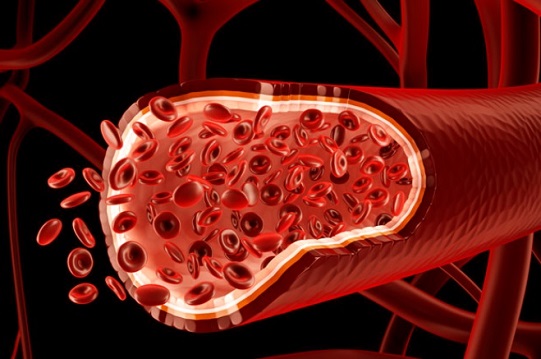Nikhil Prasad Fact checked by:Thailand Medical News Team Jan 01, 2025 3 months, 2 days, 4 hours, 8 minutes ago
Medical News: Introduction to a Silent Threat
The SARS-CoV-2 virus, the agent responsible for the global COVID-19 pandemic, has been a subject of intense scrutiny. While it is commonly associated with respiratory complications, a growing body of research highlights its profound effects on the vascular system. A study conducted by researchers from the University of Bern-Switzerland, Aarhus University-Denmark, Ludwig Maximilian University-Germany, and other notable institutions delves into the persistent inflammatory impact of the SARS-CoV-2 spike protein on human endothelial cells, which form the lining of blood vessels.
 Sustained Effects of SARS-CoV-2 Spike Protein on Human Endothelial Cells
Sustained Effects of SARS-CoV-2 Spike Protein on Human Endothelial Cells
The study focused on endothelial cells from two sources: the aorta and pulmonary microvasculature. It simulated physiological conditions to better understand how the spike protein affects these cells. This
Medical News report explores the findings of this research, shedding light on the vascular inflammation linked to COVID-19 and its potential long-term consequences.
How the Study Was Conducted
Endothelial cells are crucial for maintaining vascular homeostasis, including regulating coagulation, inflammation, and barrier function. The researchers used primary human pulmonary microvascular endothelial cells (HPMC) and human aortic endothelial cells (HAoEC) cultured under conditions mimicking blood flow. Cells were exposed to the spike protein of the original SARS-CoV-2 strain. For comparison, they were also treated with tumor necrosis factor-alpha (TNF-α), a known inflammatory agent.
The experiments revealed that the spike protein triggered prolonged inflammatory responses in both cell types. Notably, this response persisted even after the spike protein was removed. The prolonged effects indicate a potential link to the long-term complications seen in COVID-19 survivors, often referred to as Long COVID.
Key Findings: Vascular Inflammation and Beyond
-Prolonged Expression of Cell Adhesion Molecules
The spike protein induced the expression of intercellular adhesion molecule 1 (ICAM-1) and E-selectin in endothelial cells. ICAM-1 plays a key role in immune cell recruitment and adhesion, processes critical in inflammation. Surprisingly, ICAM-1 expression persisted up to 96 hours after exposure, highlighting the sustained nature of the inflammatory response. Although E-selectin expression diminished by this point, the enduring presence of ICAM-1 suggests prolonged endothelial activation.
-Release of Cytokines and Chemokines
The study found that SARS-CoV-2 spike protein treatment led to the release of pro-inflammatory cytokines such as IL-6, IL-8, and CXCL1. Many of these molecules are associated with severe COVID-19 cases. Interestingly, some cytokines, like CCL2 and IL-10, remained elevated even after 96 hours. This finding points to a chronic inflammatory state that might contribute to lingering symptoms in post-acute COVID-19 patients.
>-Increased Immune Cell Adhesion and Procoagulant State
The researchers observed a spike-protein-induced increase in leukocyte adhesion to endothelial cells. This suggests that immune cells are drawn to and retained at inflamed endothelial sites, potentially exacerbating tissue damage. Furthermore, endothelial cells treated with the spike protein exhibited a procoagulant state, marked by faster clot formation. While this procoagulant state decreased by 96 hours, some coagulation-related pathways remained active, indicating potential long-term risks.
Transcriptomic Insights
Gene expression analyses revealed significant changes in pathways associated with cytokine signaling, viral response, and coagulation. At 96 hours, genes related to antigen presentation and complement activation remained upregulated, supporting the idea of sustained endothelial dysfunction. This ongoing dysfunction may underlie the multi-organ complications observed in severe and long-term COVID-19 cases.
Implications for Long COVID and Systemic Inflammation
The findings of this study align with clinical observations of COVID-19 patients, particularly those experiencing Long COVID. Prolonged endothelial inflammation and dysfunction may contribute to a range of symptoms, including cardiovascular, neurological, and renal complications. Additionally, the persistent inflammatory state could increase the risk of thrombotic events, such as strokes and heart attacks, even in individuals who have recovered from the acute phase of the disease.
Understanding these mechanisms is critical for developing therapeutic interventions. Treatments targeting endothelial inflammation and coagulation pathways could mitigate the long-term impacts of SARS-CoV-2. For instance, anti-inflammatory agents, anticoagulants, and endothelial-protective drugs may play a role in managing COVID-19 complications.
Study Conclusions
The study underscores the profound and sustained impact of the SARS-CoV-2 spike protein on vascular endothelial cells. Key conclusions include:
-The spike protein triggers prolonged inflammatory responses in endothelial cells, evidenced by persistent ICAM-1 expression and cytokine release.
-These responses mimic, and in some cases exceed, those induced by TNF-α, a potent inflammatory cytokine.
-Transcriptomic data reveal lasting changes in pathways associated with inflammation, antigen presentation, and coagulation.
-The observed effects suggest a potential link to the systemic and multi-organ complications seen in COVID-19 and Long COVID patients.
The findings highlight the importance of protecting endothelial cells as a strategy to reduce both the acute and long-term impacts of COVID-19. Further research is needed to explore therapeutic options and validate these findings in clinical settings.
The study findings were published in the peer-reviewed journal: Inflammation.
https://link.springer.com/article/10.1007/s10753-024-02208-x
For the latest COVID-19 News, keep on logging to Thailand Medical News.
Read Also:
https://www.thailandmedical.news/news/covid-19-causes-disruptions-in-blood-brain-barrier-via-mitochondria-impairment-and-endothelial-dysfunction
https://www.thailandmedical.news/news/covid-19-increases-disruptions-in-neurovascular-coupling,-inducing-endothelial-dysfunction-among-mild-cognitive-cases
https://www.thailandmedical.news/news/persistent-endothelial-dysfunction-oxidative-stress-and-lipid-peroxidation-are-found-in-women-with-post-covid-19-health-issues
https://www.thailandmedical.news/news/australian-study-uncovers-covid-19-s-impact-on-the-endothelial-glycocalyx
https://www.thailandmedical.news/articles/coronavirus
Follow us on:
https://x.com/ThailandMedicaX
https://bsky.app/profile/thailandmedical.bsky.social
https://www.facebook.com/ThailandMedicalNews
https://gettr.com/user/thailandmedicalnews
https://www.tribel.com/thailandmedical/wall
